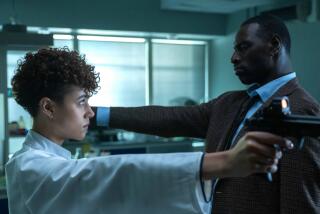‘Killers’ Screenwriter Keeps the Faith
- Share via
So what do “Natural Born Killers” and the Church of Jesus Christ of Latter-day Saints have in common? A devout Mormon named David Veloz.
Veloz is the screenwriter who gussied up the dialogue and story on Quentin Tarantino’s original script about the media and America’s infatuation with a serial killer couple.
He tithes 10% of all of his earnings--including the amount he was paid to enhance the mayhem in director Oliver Stone’s current ultra-violent film--to his church. (Stone and screenwriter Richard Rutowski also share screenplay credit; Tarantino has only a story credit.)
Veloz, 32, says that he has practiced tithing since converting to Mormonism as a teen-ager, and sees no reason to differentiate in earnings from “Natural Born Killers.”
“This is a standard commandment of the church, to pay a 10% tithing from income earned,” Veloz says. “The work on this film was no different for me. It was my first produced screenplay and I’m very proud to have worked on this film.”
But how could someone who professes to be so religious have grappled with the pure evil played out by the film’s main characters, Mickey (Woody Harrelson) and Mallory Cox (Juliette Lewis), who slay more than 50 people by the end of the film? And what does the church have to say about that?
“I see the violence in this film as comical or surreal, what a lot of people have called ‘MTV on drugs,’ ” he says. “For me, focusing on the evil and the violence of these characters was like examining the landscape of the darker side of man’s nature. It was about taking a look at the harsher side of society. I didn’t just delve into evil and violence, but I also made the story more romantic.”
To delve into that darker side, Veloz says, he pulled from such film resources as “Henry: Portrait of a Serial Killer” and such texts as convicted killer Jack Henry Abbott’s memoir, “In the Belly of the Beast,” and combed through the anthologies of such heinous killers as Jeffrey Dahmer, Charles Manson and John Wayne Gacy.
“I read all of that stuff and then got rid of it,” says Veloz. “But I had to know the subject I was dealing with.
“Was working on this film a moral dilemma for me? There was no question that I thought about that a lot. The general rule in the Mormon church is that you avoid R-rated films. And the church has a fairly strong position on violence in the media.”
As the father of two young boys, Veloz also has qualms about children and violent films. “I don’t think kids should see this movie. But in the end, I think this is a movie that has a powerful message about our world. This is not a movie meant to incite violence . . . but one meant to reflect upon it.”
LeAnne Hutchings, a spokeswoman for the Church of Latter-day Saints in Los Angeles, would only say that since “no one in our office or anyone in Salt Lake has seen this film, we don’t feel we should comment about it in any way.”
And apparently the church has no problem with the money coming from such a violent film: “We agree that the church’s policy is not to accept tithes from ill-gotten gains, such as gambling winnings or the lottery. However, in David’s situation, this is more akin to one paying tithes from earning wages in one’s legitimate line of work, as a screenwriter.”
While neither the church nor Veloz would divulge the amount of the tithe or the amount he was paid for work on the film, he did say his salary was in the very low five-figures.
Next up for Veloz, who also teaches screenwriting at USC, are a love story for Columbia called “Spidertown,” which is set in the South Bronx; another project with “NBK” producers Jane Hamsher and Don Murphy called “Gingersnaps,” which has Dwight Yoakam attached, and “The Bath,” a surreal examination, in the vein of “Altered States,” of how violent behavior is learned or inbred.*
More to Read
Only good movies
Get the Indie Focus newsletter, Mark Olsen's weekly guide to the world of cinema.
You may occasionally receive promotional content from the Los Angeles Times.










